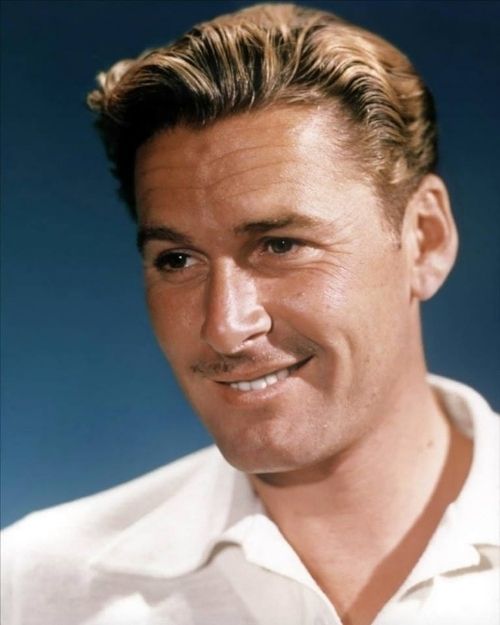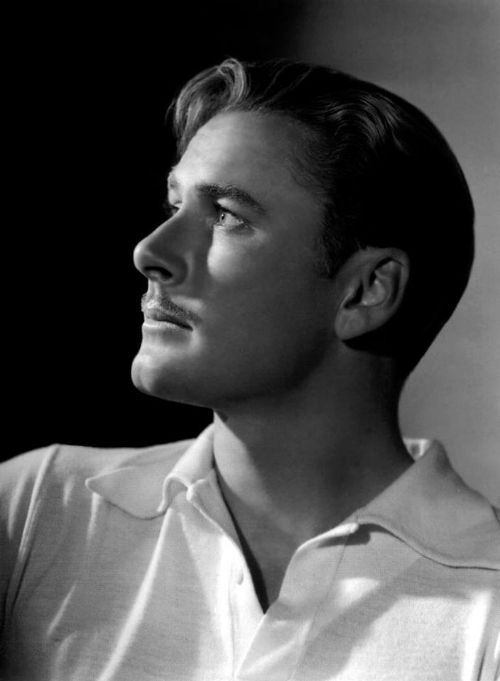The following are some comments about Errol Flynn from one of our classic film supporters, Mary Dalton. We thought we’d share her thoughts with you before our screening this Tuesday night…
I thought it would be easy to write about Errol Flynn, but my knowledge of him is actually minimal, beyond the usual stories. And when one starts to read about his life, a sense of depression inevitably takes hold. Perhaps I’m getting old, but I hate Flynn’s personal reputation, at least as biographers would have it (except for Rory, of course). Once upon a time, before appalling behavior became a cultural staple in the West, Flynn’s lifestyle was a novelty — he was a celebrity in the way that Casanova was a celebrity. But Western Culture is now in its death throes, partly due to that lifestyle, and it’s hard to write about it without a sense of weariness.
Captain Blood definitely remains my favorite movie of his. I love it because I can see him as the 25-year-old he was, full of promise, before Hollywood and his own cynicism got the better of him. Flynn would spend the rest of his life subtly mocking the larger-than-life persona he’d helped create, and one wonders if his personal scandals weren’t an attempt to kill off that persona for good. I feel like crying whenever I watch him in The Sun Also Rises, because he played a late vision of himself, and he played it honestly. I really wish he could have cut himself some slack.
Sometimes I wonder how Flynn would have seen himself had he lived into old age. This may be a stretch, but I believe that his film persona offers a brief glimpse into the “real” man. Errol Flynn wasn’t virtuous, of course, but at some level he must have believed in the idea of virtue. It didn’t exist much in Hollywood, but he must have looked for it. I don’t know how else to reconcile the mystery of him — his great charm and natural warmth set against outrageous conduct; his love for his children and his tendency to seduce young girls; his desire to serve in the war and the abuse he put his body through when he was denied by the draft board. I think he might have been happier if he could have lived his roles, rather than simply playing them. But perhaps I’m trying to psychoanalyze him too much. I don’t know any of this, of course. Maybe there is too strong a desire in me to see him as Captain Blood!
It’s possible that Errol Flynn could occasionally reconcile himself to what he’d become. There is that compelling quote of his: “I allow myself to be understood as a colorful fragment in a drab world.” This I find more interesting that any of his cryptic pronouncements on death. The way he says “I allow myself” makes me think that the reason we don’t know anything about Flynn’s inner life is because he simply chose it that way. And why not?
Who was it that spoke of Flynn as the “symbol of the unvanquished man?” I can understand why a movie like Captain Blood, and an actor like Flynn, would have such an impact on Depression-era audiences. We need stories like this now, and heroes like Peter Blood now, in our own time, but I don’t think Hollywood is capable of making them, because the industry doesn’t believe in virtue. But at least we have Flynn’s movies and can watch them whenever we need to. I’d like to think that one day the scandals and idiotic theories, like the one about his being a Nazi spy (why the hell would an iconoclast like him follow the Nazis?) will fade away and all we’ll have is Errol Flynn as he should be remembered: as Captain Blood, as Robin Hood, as the hero showing us how to prevail against the odds. It’s not the worst afterlife one can have.
Mary Dalton is a freelance writer and former publicist for Park Ridge Classic Film.

